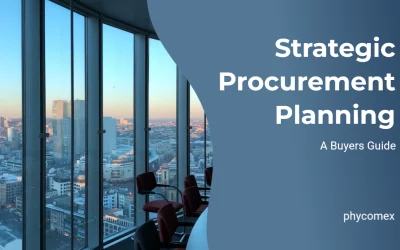Procurement is the backbone of any organization, ensuring a steady supply of products and services to keep the business running smoothly. Procurement managers are the gatekeepers of this process, responsible for managing suppliers, negotiating contracts, and developing cost-saving strategies. They are the driving force behind the procurement function and play a vital role in the success of a company.
Procurement power is an essential aspect of any organization, and those who pursue a career in procurement can expect a challenging yet rewarding journey. The path to becoming a procurement professional requires a combination of education, experience, and skills.
In this article, we will provide an overview of the procurement career path, the skills required for success, and the salaries that can be expected at different levels of the profession. We will also discuss the working conditions and challenges that procurement professionals face and how they can overcome them to achieve procurement power.
Key Takeaways
- Procurement managers are responsible for purchasing and sourcing products and services, building relationships with suppliers, and developing cost-saving strategies.
- The procurement career path starts as a trainee buyer/analyst and progresses to mid-level managers and directors.
- Procurement manager salaries vary based on experience, location, and sector, with procurement directors earning the highest salaries.
- Communication, negotiation, data analysis, and business understanding skills are essential for a procurement manager’s success, as well as attention to detail, financial awareness, and numeracy skills.
Career Overview
The career overview of a procurement manager entails starting as a trainee buyer/analyst and progressing to mid-level procurement managers who negotiate important contracts and oversee most aspects of the procurement process.
As procurement managers gain more experience, they can become procurement directors who oversee the work of subordinate managers and trainees.
To succeed in procurement, higher education in business studies, marketing, economics, supply chain management, or engineering is beneficial, as well as work experience in the industry and professional qualifications such as membership in the Chartered Institute of Procurement & Supply (CIPS).
The procurement industry is growing, and future job prospects are positive.
As businesses aim to cut costs and improve efficiency, procurement managers are becoming increasingly important.
In addition, the rise of e-commerce has led to a greater need for procurement professionals with expertise in sourcing and negotiating with online suppliers.
With the right skills, education, and experience, procurement managers can expect to have a fulfilling career with opportunities for growth and advancement.
Education and Qualifications
Higher education in business studies, marketing, economics, supply chain management, or engineering can be advantageous for individuals pursuing a career in procurement. These fields of study provide knowledge and skills that are directly applicable to the procurement industry.
A degree in business studies can help individuals understand the financial aspects of procurement, such as budgeting and cost analysis. Marketing courses can provide insight into the promotion of products and services, which can be useful in negotiating contracts with suppliers. Similarly, a degree in economics can provide an understanding of supply and demand and how to manage resources efficiently. A degree in supply chain management or engineering can provide knowledge of logistics and production processes that can be useful in managing suppliers and ensuring timely delivery of goods.
Apprenticeships in procurement are also available for those who want to start a career in procurement without a degree. Apprenticeships provide hands-on experience and allow individuals to learn from experienced professionals in the industry.
Professional qualifications, such as membership in the Chartered Institute of Procurement & Supply (CIPS), can help individuals progress in their procurement career. CIPS offers various levels of qualifications that cover different areas of procurement, such as contract management and supplier relationships. These qualifications can demonstrate a commitment to professional development and can help individuals stand out in a competitive job market.
Skills for Success
Effective communication, negotiation, and data analysis are essential abilities for achieving success in a career as a procurement manager.
Procurement managers are responsible for managing relationships with suppliers and ensuring that the company receives quality products and services at a reasonable price. Communication skills are crucial for procurement managers to effectively articulate the company’s needs to suppliers and negotiate favorable terms. In addition, procurement managers need to be able to build and maintain relationships with suppliers to ensure a consistent supply of goods and services.
Financial awareness is another critical skill for procurement managers. Procurement managers need to have a good understanding of the financial trends and be able to analyze data to identify buying and selling trends. They also need to be able to calculate profit and cost margins accurately and produce reports to inform decision-making processes.
Financial awareness is crucial for procurement managers to ensure that the company is getting the best value for money and making informed decisions that align with the company’s objectives. Ultimately, effective communication and financial awareness are critical skills for procurement managers to succeed in their roles and achieve optimal outcomes for their companies.
Working Conditions
Office-based work is the norm for procurement managers, with occasional travel to supplier sites and trade shows. While procurement managers may work standard hours in the corporate world, unusual working hours may be required to coincide with different time zones. Procurement managers may also need to work remotely, depending on their employer’s policies and location of suppliers.
They are responsible for managing suppliers across global time zones and coordinating with internal teams to achieve optimal outcomes. Procurement managers have a high level of responsibility across many departments and global time zones. They must be able to adapt to changing circumstances and work well under pressure.
While the working environment is typically office-based, procurement managers may need to travel frequently to meet with suppliers or attend trade shows. They must also be able to communicate effectively with suppliers, internal teams, and other stakeholders, and have a strong understanding of the industry and market trends.
Overall, the working conditions for procurement managers require flexibility, strong communication skills, and an ability to work well under pressure.





0 Comments